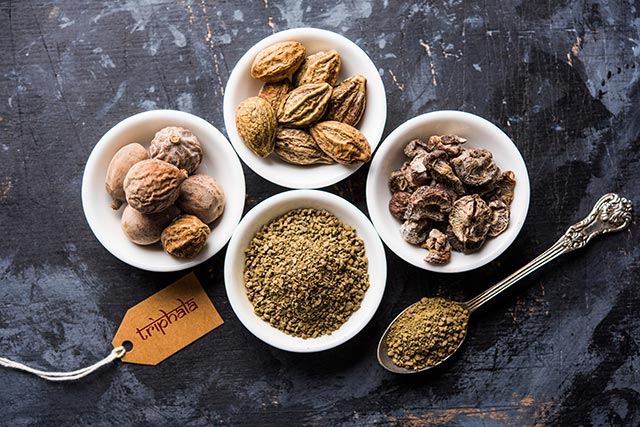
Triphala in traditional medicine
The Ayurvedic medicine triphala is a rasayana formulation, meaning that it is intended to rejuvenate and prolong life. Triphala consists of three myrobalan fruits: amla or Indian gooseberry (Emblica officinalis), chebulic myrobalan (Terminalia chebula), and beleric (Terminalia bellerica). Once rid of their seeds and combined in equal proportions, they become a powerful medicine that can address a variety of ailments. Triphala is also used in other traditional medicinal practices that were inspired by Ayurveda, such as Thai, Tibetan, and Unani medicine.
Triphala, which literally means three fruits, is a popular medicine for treating intestinal disorders that involve inflammation, diarrhea, constipation, or infections. It is also used to improve the skin and hair and to manage diabetic wounds. Triphala is traditionally the medicine of choice for the treatment of metabolism-related issues as well as skin and dental conditions. Triphala can also delay degenerative changes in the eyes that lead to the formation of cataracts.
Clinical studies on the therapeutic potential of triphala associated it with a wide range of biological activities, the most striking of which is anticancer. There is mounting evidence suggesting that triphala has chemoprotective, radioprotective, and oxidant-protective activities that could stop cancer development. Animal studies also demonstrated its antiproliferative and pro-apoptotic properties. Triphala is shown to regulate angiogenesis and to suppress tumor invasion and metastasis.
Chemical analyses of triphala confirmed that it contains many beneficial components, including saponins, terpenoids, tannins, flavonoids, and phenolic acids. In particular, gallic acid, ellagic acid, chebulinic acid, and chebulagic acid are believed to be its main active components. Chebulinic acid and chebulagic acid are both known for their antitumor activities. In some studies, however, chebulinic acid is reported to exhibit a higher bioactivity against cancer cells than chebulagic acid. Researchers believe that it is the main contributor to the anticancer activities shown by triphala.
Chebulinic acid prevents the proliferation and migration of cancer cells and promotes apoptosis
For their study, researchers from China used colorectal carcinoma cell lines with three phenotypes. They exposed the cells to several batches of triphala that contained different quantities of chebulinic acid and chebulagic acid. They also investigated the biological activities -- and the possible mechanisms underlying them -- of the more potent phytochemical in triphala, chebulinic acid.
The researchers reported that chebulinic acid exerts anti-proliferative, pro-apoptotic, and anti-migratory effects on colorectal carcinoma cells. The presence of chebulagic acid alone decreased the anti-proliferative activity of triphala, but supplementation with chebulinic acid restored its original potency. Chebulinic acid also proved itself more effective than chebulagic acid against cancer cells. These findings suggested that chebulinic acid is the key component that gives triphala its anticancer ability.
Further experiments also showed that chebulinic acid induces apoptosis and inhibits the metastasis of colorectal cancer cells. The researchers believe that the antitumor mechanism of chebulinic acid is related to the PI3K/AKT and MAPK/ERK pathways. Both the MAPK/ERK and PI3K/AKT signaling pathways are involved in the regulation of cell proliferation, differentiation, survival, and growth. Abnormal MAPK/ERK signaling, which leads to uncontrolled cell proliferation and resistance to apoptosis, is characteristic of cancer cells.
Based on their findings, the researchers concluded that chebulinic acid is a critical component of the anti-cancer activities of triphala and a promising natural, multi-target, and anti-tumor agent with therapeutic potential.
Sources include:
BMCComplementAlternMed.BiomedCentral.com
Please contact us for more information.























